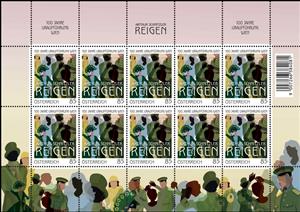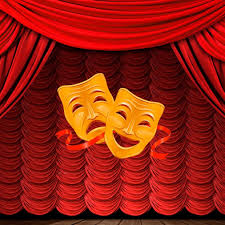Mini Sheet: Centenary of the Viennese Premiere of Schnitzler's "Reigen" (Austria 2021)
Centenary of the Viennese Premiere of Schnitzler's "Reigen" (Austria 2021)
20 October (Austria ) within release Centenary of the Viennese Premiere of Schnitzler's "Reigen" goes into circulation Mini Sheet Centenary of the Viennese Premiere of Schnitzler's "Reigen" face value 10*85 Euro cent
| Mini Sheet Centenary of the Viennese Premiere of Schnitzler's "Reigen" in catalogues | |
|---|---|
| Michel: | Mi: AT 3612KB |
Mini Sheet is square format.
Also in the issue Centenary of the Viennese Premiere of Schnitzler's "Reigen":
- Stamp - Centenary of the Viennese Premiere of Schnitzler's "Reigen" face value 85;
- Mini Sheet - Centenary of the Viennese Premiere of Schnitzler's "Reigen" face value 10*85;
Mini Sheet Centenary of the Viennese Premiere of Schnitzler's "Reigen" it reflects the thematic directions:
An anniversary is the date on which an event took place or an institution was founded in a previous year, and may also refer to the commemoration or celebration of that event. For example, the first event is the initial occurrence or, if planned, the inaugural of the event. One year later would be the first anniversary of that event. The word was first used for Catholic feasts to commemorate saints. Most countries celebrate national anniversaries, typically called national days. These could be the date of independence of the nation or the adoption of a new constitution or form of government. The important dates in a sitting monarch's reign may also be commemorated, an event often referred to as a "Jubilee".
Theatre or theater is a collaborative form of performing art that uses live performers, usually actors or actresses, to present the experience of a real or imagined event before a live audience in a specific place, often a stage. The performers may communicate this experience to the audience through combinations of gesture, speech, song, music, and dance. It is the oldest form of drama, though live theatre has now been joined by modern recorded forms. Elements of art, such as painted scenery and stagecraft such as lighting are used to enhance the physicality, presence and immediacy of the experience. Places, normally buildings, where performances regularly take place are also called "theatres" (or "theaters"), as derived from the Ancient Greek θέατρον (théatron, "a place for viewing"), itself from θεάομαι (theáomai, "to see", "to watch", "to observe").


